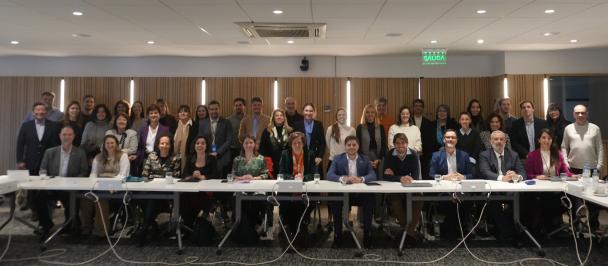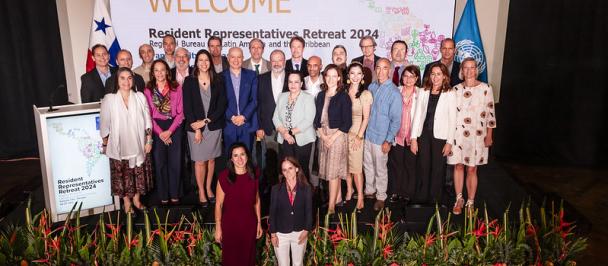It is aimed at people responsible for minors and other groups that should be vaccinated, such as pregnant women, adolescents or the elderly.
“It is today” the vaccine awareness campaign launched by the UNDP and the Bunge y Born Foundation together with the City of Buenos Aires
28 de Junio de 2024

Getting vaccinated can be a challenge for many people. Lack of time, transport or, sometimes, even information are some of the everyday life circumstances that can discourage people from going to health centers where vaccines are given freely and free of charge. These facts come from the evidence produced for Es Hoy [It's Today], a campaign to raise awareness about the need to get vaccinated that will be launched by the Ministry of Health of the City of Buenos Aires. This campaign is aimed at adults responsible for minors and other groups who need to be vaccinated, such as pregnant women, teenagers, or elderly people. Moreover, one distinctive feature of the campaign was its creation, based on the evidence and opinions shared by people in each group, through a work plan conceived and carried out jointly by UNDP and Fundación Bunge y Born.
Since 2019, Fundación Bunge y Born has been compiling the Vaccine Access and Confidence Index, based on the Vaccine Confidence Index model. In that same year, the index showed that there was an emerging sense of distrust toward vaccines, and, in the following years, it was observed that teenagers were the most skeptical about vaccination. For its part, the Accelerator Lab of UNDP, the Co-Lab, was interested in working on issues of disinformation and vaccines and carried out some actions in this regard. This shared concern led to the partnership of the Co-Lab and Fundación Bunge y Born in 2019 to conduct some studies and learn more about the sources of distrust in vaccines and the limitations people faced in getting vaccinated. Thus, they set a work agenda to deepen the understanding of the practices, experiences, discourses, and opinions of people from low-income populations regarding two central aspects: access to vaccine information and confidence in vaccines. Through the data provided by the same groups that should be vaccinated, messages and images were generated and tested to encourage people to get vaccinated. It should be noted that this issue became particularly relevant during the COVID-19 pandemic, mainly in relation to the vaccine against this virus.
The first study, conducted in 2020, consisted of forty in-depth interviews with mothers and young people who went to community meal centers in the Metropolitan Area of Buenos Aires (AMBA, by its Spanish acronym). The results revealed the existence and persistence of certain structural barriers restricting the access of this population to vaccines, such as distance and time management. Some reasons for vaccination identified were disease prevention and strengthening of the immune system. Mothers, primary caregivers, are especially motivated to protect the health of their children, while young people are vaccinated mainly to meet the requirements of social programs such as the Universal Child Allowance (AUH, by its Spanish acronym). In addition, the mothers appreciated the printed information provided on vaccines and showed a preference for plain rather than technical language. As for the young people, they said they obtained online information about vaccines and sought additional information in schools or clubs. It should be mentioned that this first study was conducted in November 2019. At the time of the study, COVID-19 vaccines had not yet been approved, and despite some lack of knowledge and trust about them, especially among young people, confidence in vaccines was generally high.
The results of the interviews helped test messages and two groups of graphic materials to emphasize the importance of staying up to date with the vaccination schedule. The graphic materials were created with photos of residents of the City of Buenos Aires taken by the group Mafia. During the second phase, in late 2021 and mid-2022, a number of focus groups were conducted to assess the communication materials and identify which ones were most effective in promoting vaccination. Another aspect evaluated was the effectiveness of positive messages to dispel misconceptions, facilitate access to information, and increase confidence in vaccines. In the Metropolitan Area of Buenos Aires, the study held seven focus groups with population segments that have stricter vaccination schedules: pregnant women, parents of young children, and elderly people. The results revealed that perceptions about vaccination vary according to age and social role. These groups showed a preference for positive messages that avoid emphasizing the consequences of being sick, and for proactive messages encouraging people to get vaccinated instead of directives or orders.
Understanding the barriers, motivations, and sources of information preferred by different population segments helps to personalize the dissemination campaigns and urge people to get vaccinated, thus increasing vaccination coverage. In addition, debunking myths and providing reliable information through appropriate channels strengthens confidence in vaccines and promotes greater adherence to vaccination schedules.

 Locations
Locations



